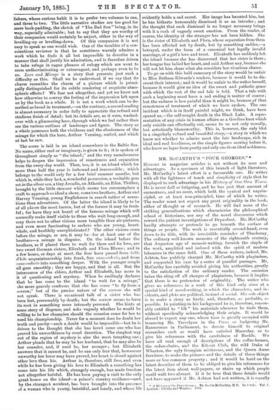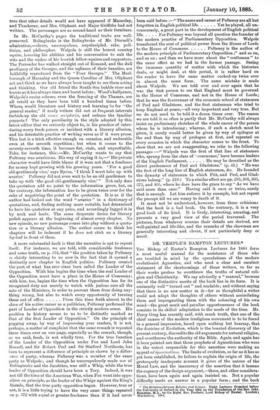MR. McCARTHY'S " FOUR GEORGES." •
HISTORY in magazine articles is not without its uses and advantages. As a specimen of this branch of light literature, Mr. McCarthy's latest effort is a favourable one. He writes with all the lightness of touch and simplicity of style that ho displayed to such advantage in his History of Our Own. Times. He is never dull or fatiguing, and he has just that amount of earnestness, and no more, which befit the cynical and unprincipled, or at least non-principled, time of which he writes. The reader must not expect any great originality in the book, either of thought or of research. He will find none of the striking generalisations which characterise the philosophical school of historians, nor any of the novel discoveries which reward the patient investigations of Dryasdust. Mr. McCarthy hardly attempts or pretends to go beneath the surface of things or people. The work is essentially second-hand, even down to its title, with its irresistible reminder of Thackeray. The ordinary well-known memoirs of the eighteenth century, that Augustu.n age of memoir-writing, furnish the staple of the work, amplified and imbued with the spirit of modern labourers in the same field. One of these writers, indeed, Mr. Ashton, has publicly charged Mr. McCarthy with plagiarism, and supported his case by a series of parallel passages. Mr. McCarthy has carefully avoided giving his authorities, greatly to the satisfaction of the ordinary reader. The omission takes the sting off all charges of plagiarism, because it implies that there is no pretension of originality. The writer who gives no references in a work of this kind only aims at a special kind of novel-writing, in which the characters, and incidents, and plots are political, instead of social. His solo object is to make a story as lively, and, therefore, as probable, as possible. In painting-in his background he is, therefore, reasonably entitled to " lift " his materials wherever ho finds them, without specifically acknowledging their origin. It would be absurd to expect any one, whose time is greatly occupied with trouncing Mr. Trevelyan in the Press or badgering Mr. Bannerman in Parliament, to devote himself to original researches such as would have satisfied Macaulay, or to give his references with the carefulness of Buckle. We have all read enough of descriptions of the coffee-houses, the sedan-chairs, and the Kit-cat Club, the wild Duke of Wharton, the ugly Georgian mistresses, and the Queen Anne furniture, to make the pictures and the details of these things more or less common property ; and it would be hard on the latest describer of them to be obliged to give his references for the latest item about wall-papers, or stairs up which people could walk two abreast. If it be true that these details would not have appeared if Mr. Ashton had not written, it is equally
true that other details would not have appeared if Macaulay, and Thackeray, and Mrs. Oliphant, and Major Griffiths had not written. The personages are as second-hand as their furniture.
In Mr. McCarthy's pages the traditional traits are wellpreserved. Bolingbroke is the Bolingbroke of Mr. Disraeli's admiration,—clever, unscrupulous, unprincipled, rake, politician, and philosopher. Walpole is still the honest country squire, lowering his abilities and his conversation to snit the wits and the wishes of his boorish fellow-squires and supporters. The Pretender has walked straight out of Esmond, and the dull profligacy of the Georges, and the ugliness of their beauties, are faithfully reproduced from the " Four Georges." The Marlborough of Macaulay and the Queen Caroline of Mrs. Oliphant act and think as we have always been taught to see them acting and thinking. Our old friend the South•Sea bubble rises and bursts as it has always risen and burst before ; Wood's halfpence, Walpole's excise scheme, even the freezing of the Thames, are all retold as they have been told a hundred times before. Where. would literature and history and learning be for "the general reader," if ready writers did not at frequent intervals furbish-up the old arena scriptoria, and redress the familiar puppets ? The only peculiarity in the style adopted by this latest editor that we seriously object to, is his practice of introducing every fresh person or incident with a literary allusion, and his detestable practice of writing verse as if it were prose. This last is a trick effective enough on occasion, and endurable even at the seventh repetition ; but when it comes to the seventy-seventh time, it becomes flat, stale, and unprofitable. Take, for instance, this :—Mr. McCarthy wants to say that Pulteney was avaricious. His way of saying it is,—" His private character would have little blame if it were not that a fondness for money kept growing with his growing years. For a good old-gentlmanly vice,' says Byron, I think I must take up with avarice.' Pulteney did not even wait to be an old gentleman to take up with the good old-gentlemanly vice.' " Not only does the quotation add no point to the information given, but, on the contrary, the information has to be given twice over for the sake of negativing the point of the quotation. It is as if the author had looked out the word " avarice " in a dictionary of quotations, and, finding nothing more suitable, had determined to have his quotation at any price, and accordingly lugged it in by neck and heels. The same desperate desire for literary polish appears at the beginning of almost every chapter. No new episode, no new personage comes into play without a quotation or a literary allusion. The author seems to think his chapters will be indecent if he does not stick on a literary fig-leaf in front of them.
A more substantial fault is that the narrative is apt to repeat itself. For instance, we are told, with considerable freshness and some truth, on p. 334, that "the position taken by Pulteney is chiefly interesting to us now in the fact that it opened a distinctly new chapter in English politics. Pulteney created the part of what has ever since been called the Leader of the Opposition. With him begins the time when the real Leader of the Opposition must have a place in the House of Commons; with him, too, begins the time when the Opposition has for its recognised duty not merely to watch with jealous care all the acts of the Ministers, in order to prevent them from doing anything wrong, but also to watch every opportunity of turning them out of office From this time forth almost to the close of his active career as a politician, Pulteney performed the part of Leader of Opposition in the strictly modern sense. His position in history seems to us to be distinctly marked as that of the first Leader of Opposition." On the principle of pegging away, by way of impressing your readers, it is not, perhaps, a matter of complaint that the same remark is repeated three times over on one page, especially as the remark, though, as we said, fresh, is not wholly true. For the true function of the Leader of the Opposition under Fox and Lord John Russell, and Sir Robert Peel and Sir Stafford Northcote, has been to represent a difference of principle as shown by a difference of party, whereas Pulteney was a member of the same party as Walpole ; and though he unscrupulously made use of Bolingbroke and the Jacobites, was still a Whig, while the true leader of Opposition should have been a Tory. Indeed, it was not till the time of the American War, when Fox went into opposition on principle, as the leader of the Whigs against the King's friends, that the true party opposition began. However, true or not, it is a little trying to have the very same things repeated on p. 372 with equal or greater freshness than if it had never been said before :—" The name and career of Pulteney are all but
forgotten in English political life Yet he played, all unconsciously, a great part in the development of English political
life For Pulteney was beyond all question the founder Of the modern practice of Parliamentary Opposition. Walpole transferred the seat of political power from the House of Lords to the House of Commons Pulteney is the author of the modern principle of Parliamentary Opposition ;" and so on, and so on ; and then we have more about the " craftsman " to the same effect as we had in the former passage. Seeing the immense quantity of matter with which the historian deals, or might deal, at this period, it is rather hard on the reader to have the same matter cooked-up twice over in almost the same form. The same mistake is made about Walpole. We are told over and over again that he was the first person to see that England must be governed in the House of Commons, and not in the House of Lords; that he was the forerunner of the economic school of statesmen of Peel and Gladstone, and the first statesman who tried to keep England at peace,—all very important and very true. But we do not need to be told it a dozen times over. The reason we are told it so often is partly that Mr. McCarthy will always insist on preliminary sketches of the whole career of the person whom he is introducing ; whereas, if such a sketch must be given, it surely would better be given by way of epilogue at the end than by way of prologue at first, and repeated on every occasion in which the character comes to the front. To show that we are not exaggerating, we refer to the following passages :—" Walpole was the first of that line of statesmen who, sprung from the class of commoner,' have become leaders of the English Parliament He may be described as the direct predecessor of Peel and Gladstone." (p. 41.) "He was the first of the long line of English statesmen, &c. He founded the dynasty of statesmen to which Pitt, and Peel, and Gladstone belong." (p. 219.) To a similar effect are pp. 295, 301, 303, 373, and 405, where he does have the grace to say " As we have said more than once." Having said it once or twice, surely that is enough. Let him enforce it by example, but not repeat the precept till we are weary to death of it.
It must not be understood, however, from these criticisms that the book is a bad book. On the contrary, it is a very good book of its kind. It is lively, interesting, amusing, and presents a very good view of the period traversed. The pictures, from whatever sources their details are derived, are well-painted and life-like, and the remarks of the showman are generally interesting and clever, if not particularly deep or novel.







































 Previous page
Previous page